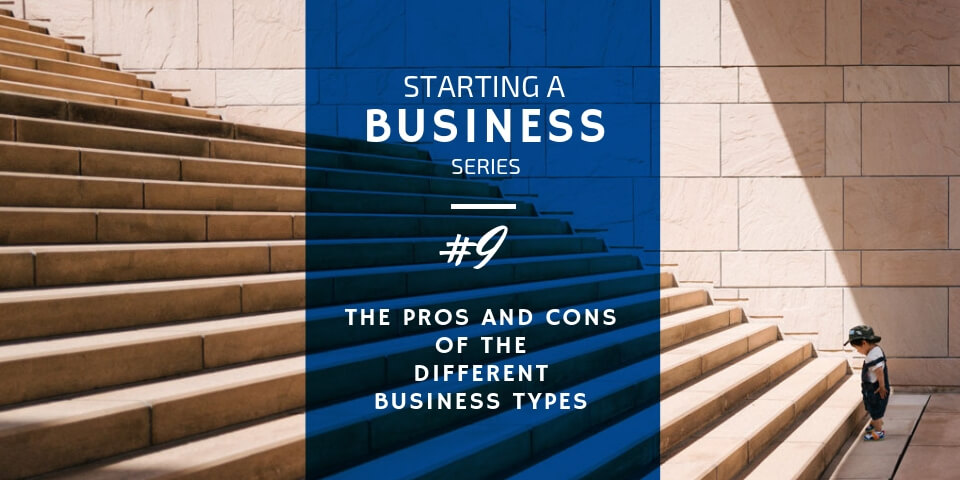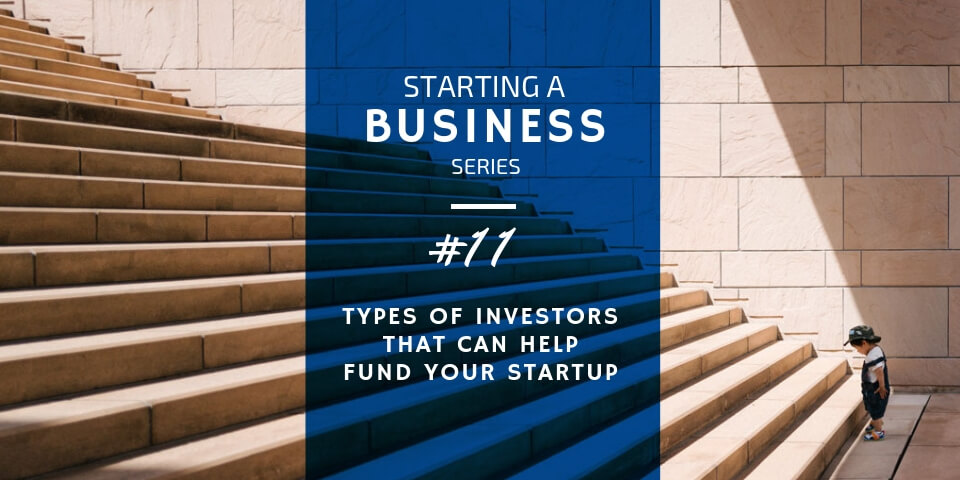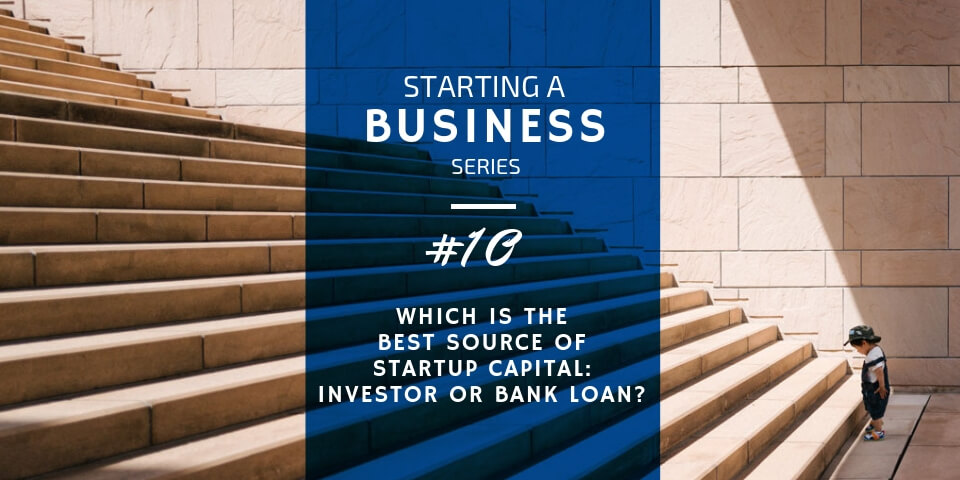
The 5 Different Business Structures… Pros and Cons of Each Entity
September 10, 2018
12 Types of Investors That Can Help with Funding Your Startup
September 24, 2018Investor vs Bank Loan… Which is The Best Source of Startup Capital?

Many start-up founders who are looking for funding run out and pitch their opportunity to anyone who will listen. I get it. They’re willing to do just about anything to make their business succeed. However, unless they are strategically targeting the right type of moneylender, their fundraising efforts may be in vain. When deciding where to spend your time—deciding between an investor vs a bank loan—it’s important you know how each works. Having a solid understanding will allow you to go to the right one—the one who is the best bet for getting the startup capital you need for your new business. Join me as I examine the best way to seek funding, investor vs bank loan.
Podcast Time Index For “Startups & Funding – Jonathan Mills Patrick Interview”
00:30 – Jonathan Mills Patrick
02:29 – How can start-ups find funding?
07:49 – How to make a Business come to fruition?
09:04 – How to get lending for a Life-Style Business?
11:22 – Autonomous Businesses and Investors
13:43 – How important are projections & can Bankers identify legitimate projections?
16:42 – How to build up Bankability?
19:08 – What is the SPA & how can it be beneficial to Business Owners?
21:19 – When shouldn’t a Business Owner use the SPA?
23:00 – Should I go into business for myself in the first place?
29:05 – How to Self Assess
31:30 – Case Example
33:41 – Wrap Up
Special thanks to Jonathan Mills Patrick – entrepreneur, business advisor, author, marketing executive, and former C-level executive in the banking industry. Some of the information used to research this article comes from my interview with him. You can listen to the interview using the link above.
Investor vs Bank Loan
Now that you’ve written out a business plan, stabilized your personal financials, selected an advisory team, and chosen a business entity for your startup, it’s time to look for a source of startup capital. Yet, you don’t want to run out, blindly searching for money. If you seek funding from the wrong people or places, you could become discouraged by refusals. So, what should you look for when weighing the option of lender vs investor?
As a general rule of thumb, lenders look at the historical while investors are focused on the future. On one hand, lenders want proof that a business is already succeeding. On the other hand, investors are interested in a business’s potential for success. Lenders want to see your ability to repay a loan, whereas investors are willing to wait for a return on their investment. So let’s dive deep into what specifically lenders and investors look for when considering funding your startup.
Lenders – What Do They Want to See?
When weighing the options of an investor vs bank loan, there are several factors to consider. Fundamentally, lenders, like banks, want to see that you have the ability to repay their loans. Honestly, they aren’t interested in ideas and promises. Instead, they want proven facts and figures. They make their money from interest rates. Therefore, they want historical proof that you make your principal and interest payments on a regular and timely basis. Not only do they want proof that you have made regular, timely payments; they want proof that you can continue to make those payments.
So how do you prove you can repay loans? What do lenders look for when considering giving you a bank loan to fund your startup?
#1 Cash Flow
Cash flow will be a factor when weighing a business loan vs investors for funding. Essentially, banks want to see a steady, predictable income. What are your revenue streams? If you’re already in business, they’ll look at your operating statement, or your profit and loss statement, to tabulate your income and your expenses. Obviously, lenders want to see that your income exceeds your expenses. They want to know that you have enough money coming each month to cover the costs of the loan AND your current operating expenses.
However, if you haven’t started your business yet, lenders will be looking at your “ordinary” income. While starting your new business, will you continue to work another job? Does that job provide stability? Is the money you receive there reliable and predictable? Do you have money coming in from investments? Can you afford to repay your loans, live your life, AND invest monthly money into your startup business? Where does your capital come from? Each of these is considered carefully by a lender before deciding to issue a loan to a borrower.
#2 Collateral
Besides looking at your ability to repay, lenders will traditionally look for a secondary source of loan repayment. They want collateral. In other words, if you don’t make enough to cover your monthly payments, can you (or the lender) recoup cash from an asset? Do you own a vehicle, boat, house, piece of property, equipment, machinery, or other valuable assets you could sell? Will their cash value cover loan repayments?
#3 Liquidity
Again, lenders want security. Sure, you may have monthly income sources and collateral, but do you also have cash in the bank? Do you have liquid assets in checking accounts, savings accounts, CDs, money market accounts, security bonds, or the like that you can use to make your loan payments? Are your liquid assets enough to cover the entirety of the loan? Can they cover 50%, 70%, or 80% if necessary?
RELATED READING: How Much of a Cash Reserve Does My Business Need?
#4 Experience
Ideally, lenders want to know that your business is and has been successful. They want to know that you have enough business and industry experience to remain successful in your field. They’ll look at your personal and business resumés. What have you done? What have you produced? Are you leading your field in manufacturing, production, or sales? Have you received any honors, awards, or certifications? Do you have enough financial and business know-how?
If you haven’t started your business yet, lenders will ask about your experience in your startup business’ industry. Are you a dentist who’s been working for another practice and now wants to start your own? Did you recently graduate with a degree in horticulture, and are now looking to start a landscaping business? Do you have the experience you need to be successful? Or, are you jumping from one industry to another? Are you a salesman making a leap into the world of manufacturing? Basically, lenders want to see that you have some sort of industry or business experience to keep your startup afloat.
#5 Business Plan Projections
Finally, and most importantly, to some, lenders want to see your business plan. Many will even skip straight to the Financial Projections section. If you’ve been in business, they’re looking to see realistic projections based on historical facts and figures. They want to see your historical growth to compare it to your forecasted growth. If your revenue has increased steadily at a rate of 7-8% per year over the last 10 years, then most likely, they’ll expect to see a 7-8% projected growth rate over the next ten years.
However, if you haven’t started your business yet, all you will have is future forecasts. You won’t have historical facts and figures. For lenders to consider loaning your startup capital, you must have realistic sales and revenue predictions. Therefore, rather than looking at non-existent historical and unpredictable forecasted projections, they’ll look to see if you’ve researched your marketplace. Have you developed your products? Do you have a marketing plan in place to reach customers? Have you chosen the “right” business entity? Have you hired talented individuals who can strengthen your weaknesses?
RELATED READING: What Should Be in a Good Business Plan?
Investors – What Do They Want to See?
Now that you understand the lender side of the investor vs bank loan battle, let’s shift to the investor side. Where lenders want to see that you have the ability to repay their loans, investors want to see that you have the potential to make a return on their investment. They understand that they’re taking a risk. They’re loaning money (sometimes taking an equity stake in the company) to entrepreneurs based on ideas and efforts, rather than historical facts and figures. However, these investors are hoping their risk will pay them back in high returns.
So what do investors want to see in order for them to consider funding a startup?
#1 Pitch Deck
First of all, investors want to see your big idea. Instead of turning straight to your Financial Projections, they’ll be looking at your company description, your product and service descriptions, and your market analysis. What is your business? What does it look like? Who’s running it? How is it structured? What products or services are you offering? What marketplace needs are you meeting? How do your products or services differ from what’s already in the marketplace?
Essentially, investors want to see that you have a well-thought-out plan (called a “pitch deck” for investors). They don’t want to invest in an idea that will never come to fruition. Instead, they want your idea to be developed and even tried, if possible. They want to see your business goals and the strategies you plan to implement to reach those goals.
#2 Owner Involvement
Additionally, investors want to believe in you, not just your idea. They want to see your passion and get caught up in your excitement. Can you prove to them you have the drive and wherewithal needed to start a business and keep it going? How much work have you put into the business already? Have you invested your own money? Are you pouring your own time and resources into the idea to show that you believe in it?
Now is not the time to be an absentee owner. If you’re seeking capital investments, investors usually want to see you putting in your own blood, sweat, and tears. They want to see your investment in the company.
#3 Accomplishments
Enthusiasm and passion for an idea are one thing, but qualifications are another. What degrees, certifications, or experience do you have in business or in your business’ industry? Do you bring intellectual capital to the table? Are you the inventor of the product or idea you’re selling? Do you possess patents or copyrights on your inventions or products? Can you procure product licensing for any patented products? How far can your intelligence take the company, and can an infusion of capital take you further?
Investors also want to see what preparations you’ve made to start your business. Have you done research and development? Have you tested prototypes or sales in your marketplace? Do you have any product pre-sales or purchase orders? Are you in contract negotiations with national retail chains? What do you expect your profit margins to be? Are your business plans realistic given current market trends and economic conditions? Do you understand your market and industry?
#4 Growth Curve Potential
At the heart of investments, is the hope for a significant return on the investment. Most investors are hoping to put their money into the next Google, Yahoo, or Amazon. Ideally, they want to invest in a startup that has the potential to become a larger-than-life, publicly-traded company. They’re asking you about your products or services, and they want to see visions of dollar signs dancing in their heads.
Yet, how do investors know if your company has that kind of growth potential? Can anyone predict whether a company will succeed or fail? Actually, yes. Many investors can determine whether your company has the potential to grow and succeed by whether or not your company’s scalable. Okay, well what is that?
In essence, scalability is the capacity to expand your business according to market demand. In other words, do you have management systems, team members, and product solutions in place that will help you increase sales and revenue while maintaining or even decreasing costs? Can you streamline or outsource manufacturing? In order for your business to succeed, you must be able to keep up with the demand for your product and services while maintaining your profitability. In essence, scalability leads to profitability, which leads to a return of investment for the investor.
#5 A Share of Equity
Finally, investors sometimes don’t charge interest on monies they loan or give to a company. Instead, the cost of their investment is a stake in the business’ equity or ownership. Often, investors are hoping that their influx of capital into the company will help the business achieve stratospheric growth over a relatively short amount of time. Therefore, they “want in” on the profits the business’ scalability achieves for owners. Therefore, they may ask for a percentage of your owner’s equity or a percent of the shares of your stock.
Banks or Sharks?
Throughout my years of working with businesses and business owners, I’ve found that lenders tend to loan money to existing, proven businesses while investors loan money to proprietary startup businesses. In other words, banks usually lend money, and “sharks” invest money. So, you’ve got a choice to make. Investment vs loan, which sounds right for your startup?
Identifying whether you can get a loan or investment is the first step you need to take when you’re searching for ways to fund your startup. For more information about additional ways to find investors’ money, read our next article: 12 Types of Investors That Can Help with Funding a Startup.
Think you’ve got the next BIG IDEA but you’re not sure how you’re going to make it a reality? Schedule a meeting with the experts at Financially Simple! Our team will meet with you to determine if you’re business is a good match for our services.




